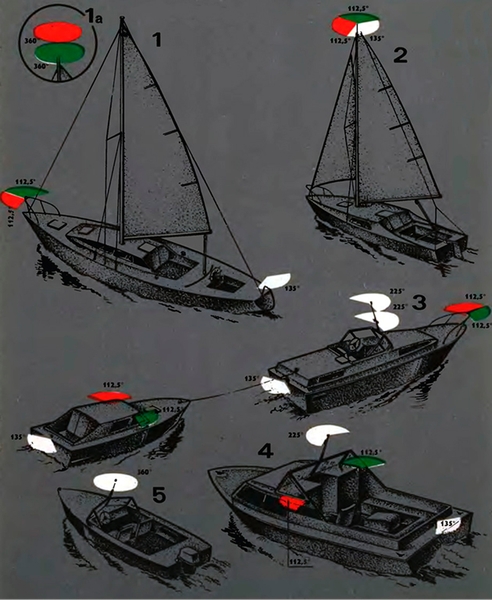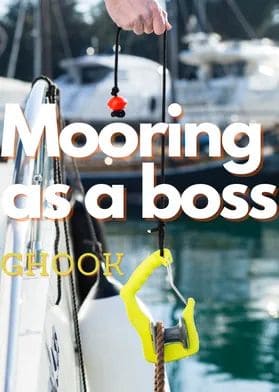Portside LightsProducts found: 26
Sale of Portside Lights for Boat
Interested in portside lights for yachts? The topRik marketplace offers a wide range of boat lighting from the best manufacturers of navigation lights. This catalog with prices includes models from Plastimo, Hella Marine, Den Haan Rotterdam (DHR) and other manufacturers of navigation lights.
If you find it difficult to choose suitable navigation portside lights for your yacht, seek advice from experienced yachtsmen. topRik experts will answer all your questions right now for free – through a feedback form on the website or by phone. Or you can send your questions to our email address [email protected].
It is difficult to consider port side lights separately from the entire vessel's navigation light system. After all, the main navigation lights used in the dark or when visibility deteriorates during the day are side lights: green on the starboard side, red on the port side, as well as white on the masthead (shines directly from the bow) and stern (located as close as possible to stern).
Depending on the relative position of these lights, the navigator can determine the angle of another vessel. For example, if you see only a green side light, then it is clear that the ship is sailing to starboard in relation to the observer.
If the boatmaster sees both green and red side lights, and possibly the masthead lights on the vertical line or close to the line, this means that the vessel is heading directly towards the observer.
The examples listed are, of course, simplified. In fact, in practice the assessment will largely depend on the experience and qualifications of the skipper. We have provided these examples to explain how portside lights fits into the vessel's navigation light system.
Purpose and Advantages of Portside Lights
The use and classification of navigation lights on ships is regulated by the International Regulations for Preventing Collisions at Sea (hereinafter referred to as COLREG-72 or the Rules). For each region, the Rules for the navigation of vessels on inland waterways also apply. These “sea” and “river” regulatory documents are basically identical, moreover, they equally divide vessels into categories depending on their length. They also stipulate the recommended and mandatory schemes for equipping yachts, boats and ships with signal lights, thereby providing little freedom of choice.
In accordance with COLREG-72, navigation lights must be turned on during the dark period of the day - from calendar sunrise to sunset, as well as during the day in conditions of limited visibility.
Both sets of Rules require that any single motorized vessel over 7 m in length (and when sailing on inland waterways - with an engine power over 25 hp) must carry while underway:
- the right distinctive side light is green with a lighting sector on the starboard side of 112.5° (from the centerline of the vessel along the bow and extending 22.5° abeam);
- the left distinctive side light is red with the same indicators as the right one, but with a lighting sector on the left side. Distinctive lights should be installed at the level of the bridge or gunwale in such a way that the light of the light is not visible from the opposite side, i.e. the light does not cross the center line along the bow of the vessel;
- the masthead light is white with an illumination sector of 225° (112.5° on each side) from the bow of the vessel. For vessels less than 20 m in length, the masthead light is carried at a height of 2.74 m above the gunwale, but not less than 1.0 m above the distinctive side lights; for vessels less than 12 m in length, the second of these requirements must be maintained.
For a sailing vessel underway, it is mandatory to display side lights along with the stern lights. Installing these lights on sailing yachts has its own challenges due to the low deckhouses, which can cause the lights to be obscured by waves. Sails can also hide lights mounted on the shrouds. The recommended location for mounting the red/green combination light is on the bow rail, which gives a clear line of sight to the right and left of the boat.
Sailing yachts going out into the open sea, in addition to standard side and stern lights, must be equipped, according to international regulations, with two special lights at the top of the mast - red and green directly below it. These lights increase the chances of a sailing yacht being visible several miles out at sea, where conventional sidelights are often insufficient to provide visibility.
Sailing vessels between seven and twelve meters in length can use fusion lighting, which combines the distinctive and stern lights, placing them at the top of the mast.
Role of Portside Lights in a navigation light signaling system is similar to the task of starboard lights: each of these lights illuminates from its side a continuous light on an arc of the horizon of 112.5° and is so installed as to shine from a direction straight ahead to 22.5° abaft the beam of the corresponding side. On a vessel less than 20 m in length, side lights can be combined in one lantern, positioned in the center line of the vessel.

To ensure maximum safety on the water, not only the procedure for installing onboard navigation lights has been developed, depending on the size and type of the vessel, as well as its condition. The Rules stipulate requirements for the intensity of navigation lights, based on which side lights must be visible at the following minimum distances:
- on ships 50 m or more in length - 3 miles;
- on ships with a length of 12 m or more, but less than 50 m - 2 miles;
- on ships less than 12 m in length - 1 mile.
Main advantage of Portside Lights is an opportunity for an oncoming vessel to determine not only the location and angle of your yacht, but also the course of movement, as well as maneuver.
Types of Portside Lights
As in household lighting fixtures, port side navigation lights , incandescent, halogen and LED lamps are used. Depending on the types of lamps used, the types of Portside Lights.
Portside Lights with Incandescent Lamps
An incandescent lamp is a budget-friendly and time-tested type of lamp. For a hundred years its design has hardly changed. The lamp consists of a base and a glass bulb, inside of which there are a thin tungsten filament and electrodes in a vacuum (or gas). When the light bulb is turned on, electricity passes through the base, the filament glows and shines. The gas inside the flask (usually argon) is needed so that the filament does not burn out so quickly. Incandescent lamps have a color temperature of 2700-3000 K.
An incandescent lamp lasts approximately 1000 hours and requires reliable protection in marine environments. The main advantage of incandescent lamps is their low price.
The topRik marketplace offers options of Portside Lights with incandescent lamps. The cases are made of non-magnetic plastic (marine polycarbonate), resistant to salt water and shock, the degree of protection is IP55.
Halogen Lights for Yachts
Halogen lamps can be called improved incandescent lamps. Everything inside them is the same: thread, electrodes and gas. Additionally, halogens are pumped into the flask: bromine and iodine vapor, thanks to which the light bulb shines 2-4 times longer - up to 4000 hours. These same pairs increase the brightness of the light. The color temperature of halogen lamps is slightly higher than that of incandescent lamps - from 2900 to 3200 K.
The power of halogen lamps ranges from 1 to 20 kW. At the same time, a 20 W halogen lamp produces approximately the same light as a 40 W incandescent lamp, but consumes less electricity. About 35% of the power of halogen lamps is spent on heating, and 65% on lighting, but this is still not enough to call them energy-saving.
When replacing the bulb of a halogen lamp, you should not touch it with bare hands, because touching your fingers leaves fingerprints on it, which then burn and darken, and the glass in these places overheats, so the light bulb burns out faster. To prevent this from happening, wear gloves and only grasp the lamp by its fasteners.
LED Portside Lights
LED lamps are the most modern, durable and efficient when it comes to energy consumption, which is important on an autonomous ship. They outperform other types of lamps in all respects, and the only drawback is the high price for the lamp itself. But a long service life with proper operation and the absence of manufacturing defects, as well as efficient energy consumption, compensates for this drawback, and often completely eliminates it.
At the same time, a 10 W LED lamp produces the same light as a 100 W incandescent lamp.
Additional benefits of LED portside lights:
- LEDs burn on average for about 50,000 hours.
- Compared to halogen lamps, they are brighter and illuminate 5-10 times a larger area.
- The color temperature range is as wide as that of fluorescent lamps: 2,700-6,500 K.
- LED lamps are suitable for use in aggressive environments, in wind, rain, and temperature changes, which are common in long-distance voyages.
- They heat up even less than fluorescent ones.
- Completely safe and environmentally friendly: no need to look for a lamp disposal point, you can simply throw it in the trash.
If you wish, you can buy any type of portside navigation lights or just a housing without a lamp, and from us you can select the necessary halogen or LED lamp.
FAQ
What are navigational portside lights?
Port side navigation lights are red signals, which together with the green starboard light s make up a pair of onboard navigation lights required for installation on both motorboats and sailboats.
Why is it important to install portside lights on a boat or yacht?
Portside lights serve to identify the maneuver of oncoming vessels, help them determine the angle and course of the oncoming boat in order to avoid a collision.
Are there any color requirements for navigation portside lights?
As required by the International Regulations for Preventing Collisions at Sea and the Rules for the Navigation of Vessels on Inland Waterways, port side lights must be exclusively green.


